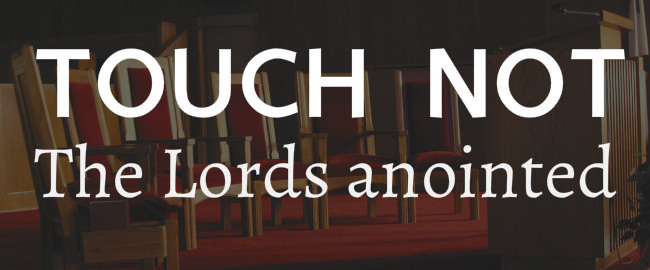Touch not my anointed
One of the typically abused texts that Ghanaian Christians are quick to quote when their favourite pastor/prophet/bishop etc is under criticism is Ps 105:15
“Do not touch my anointed ones, do my prophets no harm” (Ps 105:15).
But are we sure we understand this verse?
What Ghanaian Christianity Means By This Phrase
This has become a blanket statement to prevent any form of questioning of the teaching or practice of church leaders. Its usage is particularly very dominant in certain circles of Christianity, who limit all their experience and knowledge of Christianity through the lens of their beloved preachers. Any criticism of such preachers therefore elicits not a welcome ear to listen and think through the accusation/critique, but a knee-jerk reaction to defend such beloved preachers/prophets, even to possibly naming the critique as a “heretic” or “unspiritual person”. And this is further worsened by such preachers also intentionally exploiting the above verse as a means to defend themselves, leading their followers to assume that that is the proper way to understand this verse.
What The Phrase Means in Context
This is probably the easiest abuse of the bible to detect; yet the dominance of this abuse simply amazes me. This is because one can see what the author of the Psalm is talking about by simply reading the whole Psalm 105 from beginning. The Psalm begins by calling Israel to give thanks to God for what he has done for them.
“Give praise to the Lord, proclaim his name, make known among the nations what he has done” (v 1)
The author then proceeds to state the exact things that Yahweh has actually done for them.
“Remember the wonders he has done, his miracles, and the judgments he pronounced, you his servants, the descendants of Abraham, his chosen ones, the children of Jacob … He remembers his covenant forever, the promise he made, for a thousand generations, the covenant he made with Abraham, ‘To you I will give the land of Canaan as the portion you will inherit’ … When they were but few in number, few indeed, and strangers in it … He allowed no one to oppress them; for their sake he rebuked kings; ‘Do not touch my anointed ones, do my prophets no harm’ ”(v5-15).
It is obvious from the above (paying attention to the portions I’ve emphasized in bold) that the Psalmist is talking about how Yahweh protected HIS CHOSEN PEOPLE from harm while they travelled from Egypt to Canaan, so that they may obtain God’s promise of ENTERING THE LAND OF CANAAN. In the process, God actually defeats both Og, king of Bashan and Sihon, king of the Amorites just to get his way. These are the “kings” he rebuked (as well as Pharaoh of course). The theme of Yahweh defeating Og king of Bashan and Sihon king of the Amorites is repeated in many Psalms (Ps 139;135;68) as well as the rest of the Old Testament, and is told to remind the people of ancient Israel how God had led them to “the land”. Even before the reading of the Ten Commandments to the people in Deuteronomy, it is preceded with reminding the people of God how he took them from Egypt, defeated Sihon king of the Amorites, Og king of Bashan before bringing them to conquer Canaan (Deut 2,3).
Therefore the reference to “anointed one” and “prophets” here is but a reference to the nation Israel.
So What?
Obviously the above cannot be used to defend only certain preachers, simply because it doesn’t even refer to them. But as usual, many Christians like to mine the Old Testament to justify what they are bent on doing without first understanding the Old Testament on its own terms as a document that records the history and stories of God’s relationship with his chosen people. And when the OT is read only for its “mining” or allegorical value, these are the kinds of results we get (an example is the “seven to one” misinterpretation that occurred recently from one of the leading Ghanaian preachers). So having done the correct thing above, let us then indulge the “miners” of the OT and apply the text properly.
If the church is Israel expanded then this passage is specifically talking about us all as God’s anointed and God’s prophets. None of us is more anointed than the other. The only anointed one is Jesus Christ (which is what Christ means i.e. the anointed one), and we are all anointed because we are a part of his body. In the same way the passage is talking about the nation Israel, let’s be minded to speak of the church as God’s anointed and prophets, and let’s stop giving our favourite preachers/prophets/bishops the free pass to move from being people who are tasked with preparing us for works of service to people who are performing a show for us which we have to accept whether we like it or yes because “they are the anointed” and we are the mere mortals.
If we truly are serious about doing this, we can start the process by simply refusing to refer to such men as “anointed”. How hard can that be? Will a few sacred cows be lost by doing so?

